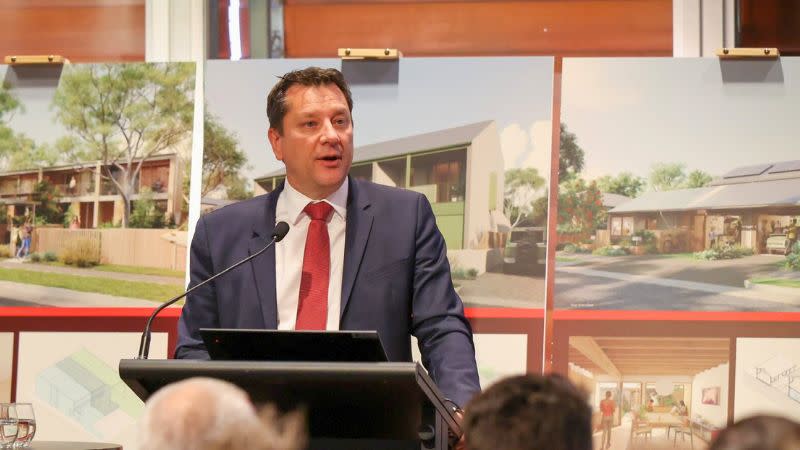
Industry voices have welcomed new legislation designed to reshape the NSW planning system, which the opposition is supporting in a fast-track through the Parliament.
The NSW Planning System Reforms Bill 2025 will overhaul the Environmental Planning and Assessment Act 1979, delivering a shake-up without starting from scratch, stakeholders say.
The bill contains a slew of amendments and new provisions, chief of which is the establishment of a Development Co-ordination Authority: a one-stop shop for development assessments. The DCA will provide advice on development applications and planning proposals on behalf of all NSW Government agencies.
Other key elements of the bill include the establishment of the Housing Delivery Authority in legislation; an expansion of the Complying Development regime; and the introduction of a new Targeted Assessment Pathway.
Under the new Complying Development scheme, councils will have 10 days to approve small variations on a complying development application, or have it deemed approved.
The Targeted Assessment Pathway will bridge the gap between a typical development application and a complying development, for projects with strategic planning and community engagement already in place, the government said.
NSW planning minister Paul Scully said that in NSW, “90 per cent of development applications are for less than $1 million—to put it simply, we are sweating the small stuff”.
“We need a planning system that supports the delivery of more homes, jobs and investment in an economically, socially and environmentally sustainable way.
“Housing is the number one issue for the people of NSW. We need legislative reform, and we need support from every end of the political spectrum so that the system that has guided NSW’s development for the last 50 years can guide NSW’s development in the future.”
Although much of the detail of the reforms remains to be clarified, industry leaders have welcomed the bill as a sign of good faith and positive activity.

“The proposed Development Co-ordination Authority could be a really powerful mechanism, but only if it’s empowered to exercise the functions of agencies. If it’s still just purely a co-ordination role, it probably won’t be as impactful as you think,” Horsfield said.
Some benefits are immediately visible, while other impacts will need time to reveal themselves, according to Horsfield.
“[For] mums and dads, it should be much easier for them to get a housing approval and build. So all those changes to expand CDCs, introduce flexibility, and make sure the kind of assessment actually matches the complexity of the development, are good.”
Horsfield said that the industry would be pleased to see confusing elements of the EP&A Act clarified as the reforms are rolled out, such as the interpretation of non-discretionary standards.
“There is a lot of detail in there, but at the end of the day, I think all of these reforms are about trying to simplify the system, create greater consistency and certainty, and that is positive…any reforms that simplify planning in New South Wales to deliver homes faster is a positive.”
“Hats to off the government for really being bold and continuing to look for levers.”
The bill has been welcomed by the sector, despite the lack of clarity in how its elements will operate.
Property Council NSW executive director Katie Stevenson said that her organisation is “taking a careful look at the details of the Bill, and we’ll be closely monitoring the debate as it progresses through Parliament in the coming weeks”.
“What’s already clear is that the reforms intend to overcome obstacles in the planning system to better support investment in NSW – from major housing precincts through to retail, commercial and industrial development.”
Urban Taskforce chief executive Tom Forrest said the bill enshrining housing as an object of the EP&A Act was a “seismic shift”.
“For too long NIMBY councils have been able to nit-pick and hold back housing through development control plans (DCPs) that some councils have used to frustrate development with reference to relatively minor issues of non-compliance,” Forrest said.
“The principle of proportionality as part of the Objects of the Act will ensure the need for housing weighs more heavily when it comes to planning decisions.”

Scully said the reaction to the bill “demonstrates there is consensus that reform is essential”.
“The broad support we’ve seen shows these reforms are the right step to deliver more homes, faster, and give young people and families a fair shot at living where they want.
“I am encouraged by the supporting statements that the Opposition have made. I would say to everyone let’s not delay these reforms and play politics with them. Let’s get on with it.”
With the NSW opposition supporting the development and passage of the bill, the legislation could be passed within weeks.
Other bills recently introduced by the government include Environmental Legislation Amendment Bill 2025, which will allow complying projects to re-use asbestos waste on-site; and increasing the threshold for the requirement to report pollution incidents from $10,000 to $50,000.




